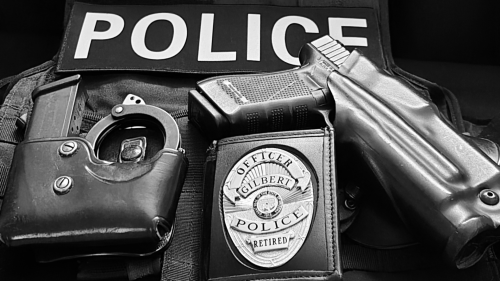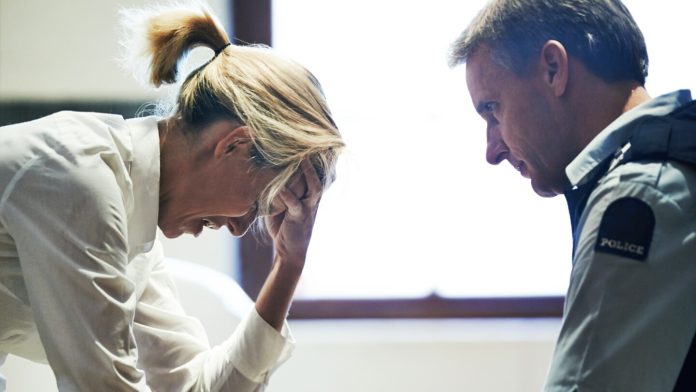[[{“value”:”
Thank you for reading this post, don't forget to follow and signup for notifications!
Editor’s note: This essay is part of “Stories from the Street,” a Police1 series featuring first-person reflections from officers across the country. These essays are about the lived experiences and moments that changed how officers think, lead and serve. If you have a story to share, we’d love to hear from you. Submit your story here.
If you’re a police officer, you know the question before it’s even asked. It shows up at parties, family gatherings, chance conversations — always the same one. “What’s the worst call you’ve seen?”
It usually comes casually, almost innocently, as if they’re expecting a dramatic story full of lights, sirens and adrenaline — something fit for a TV show with the “Bad Boys” theme playing in the background. What they don’t realize is how fast that question can rip open a lifetime of scenes we’ve tucked away so deeply we’re no longer sure where the compartments end and where we begin.
So we do what we’ve been conditioned to do. We smile, shrug and reach for a harmless story: a foot pursuit, a chaotic crash, a close call. Something exciting enough to satisfy curiosity but sanitized enough to protect the audience from the truth. Because we know the truth would land like a heavyweight punch.
Recently, someone asked me that question again, and this time, for reasons I still can’t fully explain, I didn’t give the rehearsed response. I didn’t offer the PG-13 version or the story with the soft landing. I told the truth.
I chose one call. It wasn’t the worst or the most gruesome. Just one that still stays with me — one that surfaces on nights when sleep is shallow and quiet feels too loud. I described it plainly, without theatrics. When you’ve lived it, you don’t need embellishment.
As I spoke, I watched their expression shift from confusion to disbelief and eventually to the unmistakable sadness that comes when someone realizes — really realizes — what this job asks of the people who do it.
By the time I finished, they were fighting back tears. I stood there stoically, not because the story didn’t affect me, but because after years in this uniform you learn how to disconnect emotion from delivery. It’s a survival skill, but it comes at a cost.
This interaction highlights something we all know but rarely confront: the enormous weight officers carry over a lifetime of service.
The burden beneath the badge
Officers don’t hide the truth because we’re secretive. We hide it because we’ve spent years learning to protect the people around us — the public, our families, even each other — from a reality that feels too dark to share.
We file trauma away like case reports: organized, labeled and stacked neatly out of view. We answer questions with stories that entertain instead of stories that expose. We become experts at giving people only what we believe they can handle. And in doing so, we convince the world, and sometimes ourselves, that we’re unaffected. But the reality is different.
Every officer I know carries a mental catalog of things they’ve seen, heard, touched, smelled, held and survived. Things they never intended to witness when they first pinned on the badge, often as nothing more than a 20 something kid. Things they’d never wish on another human being.
“We file trauma away like case reports: organized, labeled and stacked neatly out of view.”
The reaction that stayed with me
Watching this person react to my story made me pause. The sadness on their face and the disbelief in their voice forced me to confront how normalized trauma has become in this profession.
What shook them barely registers on my internal scale anymore. That should concern all of us.
I walked away from the conversation feeling two things at once: validation, because moments like that confirm the urgency of officer wellness; and worry, because if just one experience hits that hard, what does that say about the hundreds we carry?
Wellness has improved, but we are nowhere close to done
I’m a strong advocate for officer wellness and peer support. I believe in it. I’ve seen it work. I’ve watched officers pull one another back from the edge simply by having someone who understands.
We’ve come a long way in the past decade. Stigma is lower. Support systems are stronger. Training is better. More officers are willing to talk. But we still have a culture built on silence.
For every officer who reaches out, there are dozens who swallow it down. For every department with supportive leadership, there are others still stuck in the “suck it up” era. For every policy, program or EAP referral, there’s still an officer who feels safer saying “I’m fine” than admitting “I’m not.”
Despite progress, the emotional distance between what we experience and what we allow ourselves to feel remains enormous. If a single, non-graphic retelling made someone else tear up while I remained composed, that’s not strength. That’s conditioning. And conditioning without support eventually becomes damage.
The question behind the question
When the public asks, “What’s the worst call you’ve seen?” they’re really asking something else: What does this job do to you? Who are you behind that uniform? What does it cost to serve?
They don’t truly want the details. But they do want, and deserve, to understand the weight of the responsibility that isn’t seen. And officers deserve something too. Permission to stop pretending the weight doesn’t exist.
Why I finally told the truth
Maybe I answered honestly because I’m later in my career. Maybe because I’ve seen peers struggle silently until silence became its own form of injury. Maybe because I’ve watched this profession lose too many good people — not to violence, but to the private battles they never felt allowed to voice. Or maybe I just reached a point where the truth felt like the only responsible answer.
If the person in front of me reacted to my truth with such sadness, maybe that sadness is the reality check the public needs — not the graphic details, but the understanding that this career reshapes you in ways you don’t fully grasp until the day you step away and the silence closes in behind you.
“When the public asks, “What’s the worst call you’ve seen?” they’re really asking: What does this job do to you? Who are you behind that uniform? What does it cost to serve?”
What I want officers and readers to take away
If you’re an officer reading this, I hope you hear this clearly. You don’t have to minimize your own story. You don’t have to pretend trauma slides off you. And you don’t have to keep protecting everyone else from the truth at the cost of carrying it alone.
And if you’re a civilian, understand that when you ask an officer about “the worst thing they’ve seen,” you’re touching a deep well of experiences most people will never fully comprehend. Curiosity is fine. Compassion matters even more. Just recognize the weight behind whatever answer you’re given — or not given.
And for all of us, we cannot keep treating silence as strength. We’ve lived the consequences of that lie for too long.
That brief conversation reminded me of something I hope every officer remembers: We may deliver the story without emotion, but the burden hasn’t left us. It just hasn’t been given a place to land.
Until we create space for honesty, healing and real support, we will continue asking officers to carry more than any human should. And they will continue to do it quietly.
STORIES FROM THE STREETS





Gangs
What every young cop gets wrong about gangs
Young officers often mistake confrontation for control. The best gang cops know conversation, consistency and documentation are what truly build cases

“}]]



